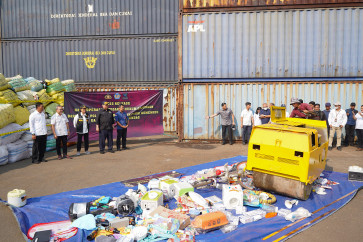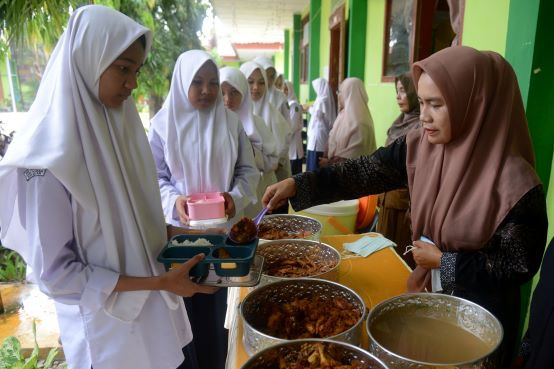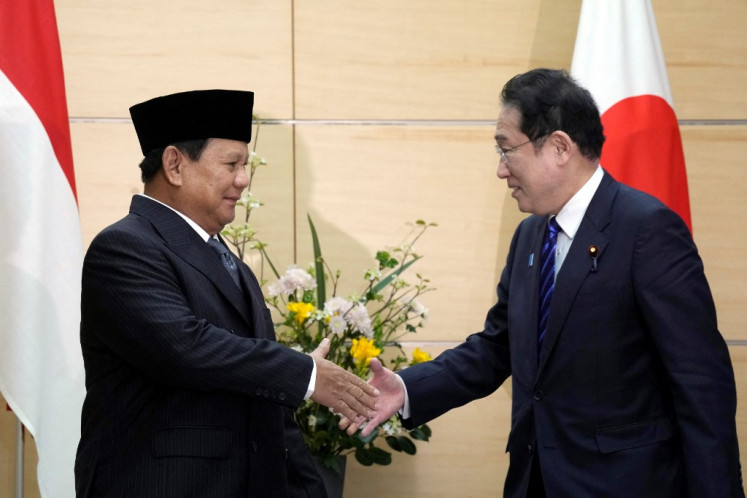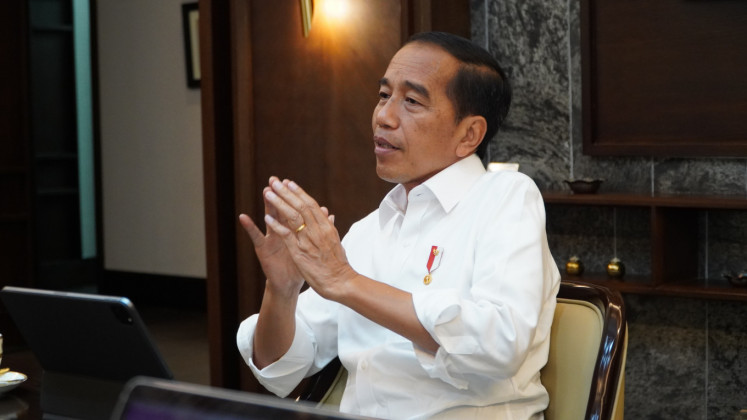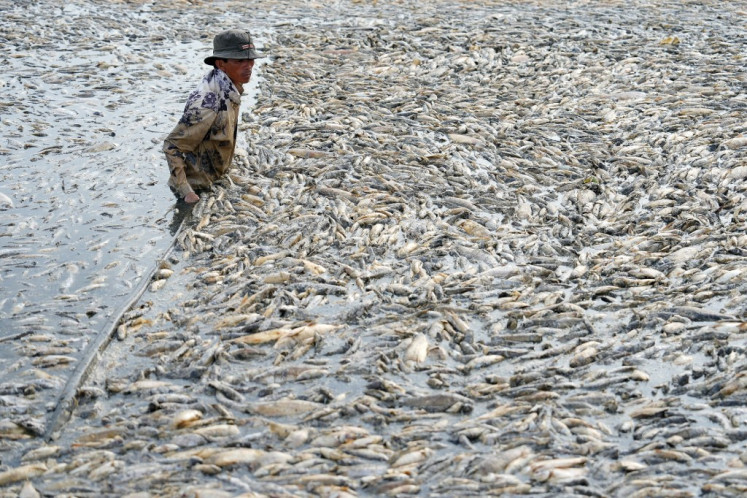Papua: Dialogue has different meanings
The massacre of construction workers pioneering a section of the trans-Papua highway in on Dec. 2 in Nduga, a remote area of highland Papua, has put that troubled province back in international headlines.
Change Size
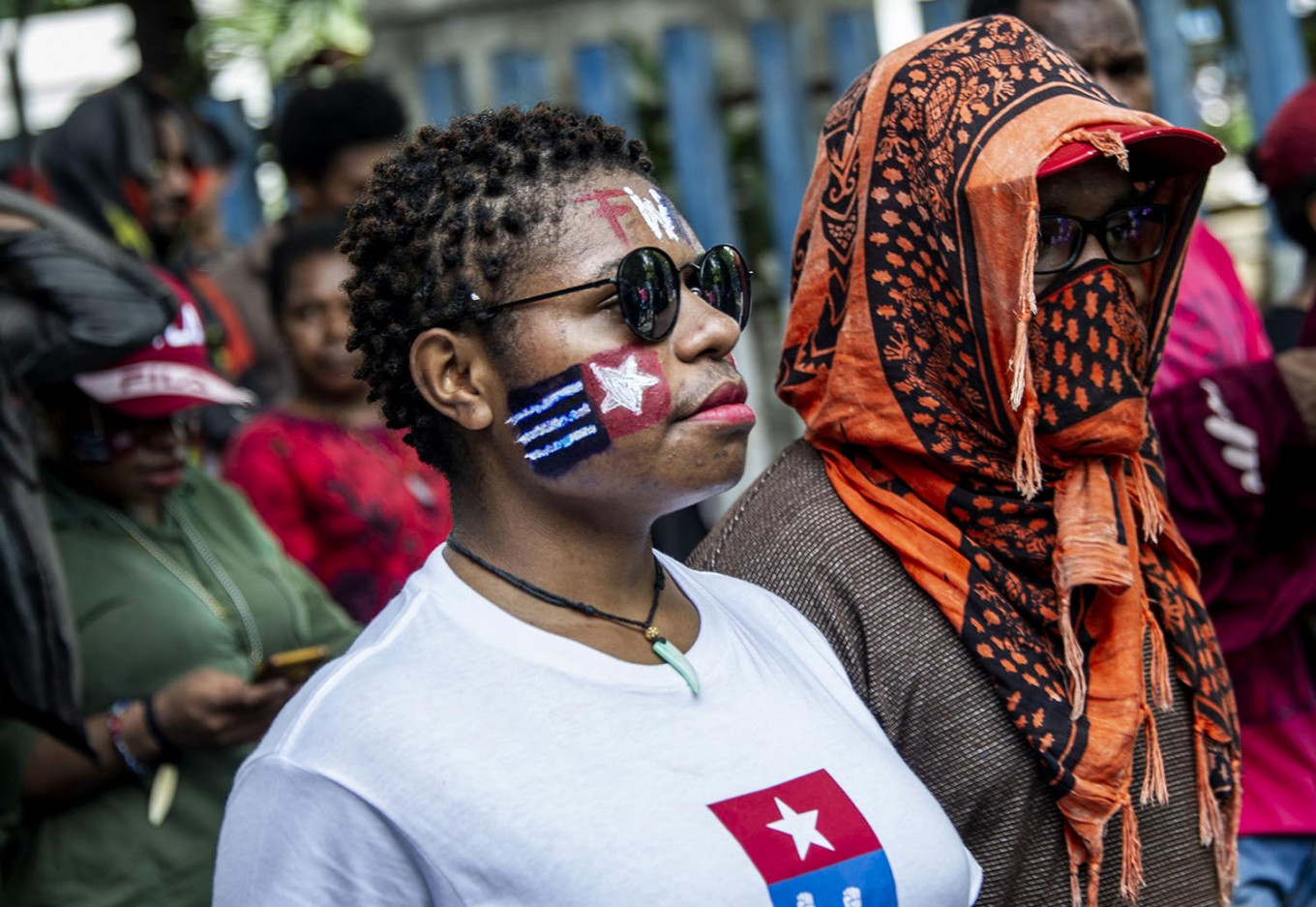 Papuans take part on a parade in Surabaya, East Java province, on December 1, 2018, during a commemoration of the independence day of Papua from Dutch colonial, which is then commemorated every year by separatists as a symbol of their freedom from Indonesia. (AFP/Juni Kriswanto)
Papuans take part on a parade in Surabaya, East Java province, on December 1, 2018, during a commemoration of the independence day of Papua from Dutch colonial, which is then commemorated every year by separatists as a symbol of their freedom from Indonesia. (AFP/Juni Kriswanto)
T
he massacre of construction workers pioneering a section of the trans-Papua highway in on Dec. 2 in Nduga, a remote area of highland Papua, has put that troubled province back in international headlines. And while the government of Indonesia’s ambitious road-building plan reflects in-part a coherent natural resource extraction policy, the killing of the workers implementing that policy serves to reflect a half-century of government failures when it comes to indigenous Papuans.
With this in mind it’s useful to consider both Indonesian government and separatist initiatives to resolve Papua’s myriad conflicts. Opposing sides cite the need for dialogue — but the definition of “dialogue” has markedly different meanings for each.
Dialogue first emerged as a policy tool in 2008 when the Indonesian Institute of Sciences (LIPI) created a Papua “policy road map” for the consideration of the Susilo Bambang Yudhoyono government. The roadmap grouped the causes of Papua’s conflicts under four categories: first, marginalization of and discrimination against indigenous Papuans; second, the failure of equitable development; third, contending accounts of the history of Papua’s incorporation into Indonesia; and fourth, state violence against Papuans.
LIPI then proposed a four-pronged policy platform: first, recognition of Papuans as the traditional owners of their land; second, a new paradigm of development focusing on Papuans; third, dialogue in order to reach agreement on a shared history; and fourth, reconciliation through justice for the victims of past abuses.
While much of the roadmap is, for now, undeservedly and dangerously shelved, the dialogue it has recommended is not. It has become a scale upon which extreme positions are now marked.
The Indonesian government’s version of dialogue focuses on the less-political aspects of government involvement in Papua. The administration of President Joko “Jokowi” Widodo stated an intention to partly follow the roadmap recommendations, but the need to address human rights cases was soon deprioritized in favor of dialogue around service delivery, mainly health and education.
Such a platform would likely lead to discussions beyond service delivery, and so the need for such a dialogue is there, but there is little appetite amongst elements of Papuan civil society for such discussions when government agents have and do kill Papuans with impunity.
This leads to the separatist definition of dialogue, best found in the position of Benny Wenda and the United Liberation Movement for West Papua (ULMWP). There, a dialogue is solely about Indonesia’s unlawful incorporation of Papua into Indonesia through the staged “Act of Free Choice” in 1969, as well as the multitude of rights abuses which preceded and followed that act. This dialogue would take the shape of an international tribunal, in English, and would then lead to a referendum on independence.
Needless to say, a considerable gap exists between the two positions. Whether the gulf can be bridged in a manner acceptable to Papuan civil society and communities on one hand and the government of Indonesia on the other remains to be seen.
When it comes to dialogue, if Jakarta wishes to be taken seriously by its own citizens, Papuan citizens in particular, then human rights must be on the agenda of any future discussion. This is particularly poignant given that we have just passed the fourth anniversary of the Enarotali massacre, when security forces shot dead four Papuan teenagers and wounded at least 17 others on Dec. 8, 2014.
Jokowi himself promised justice for those victims but four years on none is forthcoming. The injustices of ruinous health and education systems are important, but not as important as an end to impunity. The government has the option to not discuss such human rights violations in a Papua dialogue only so long as it solves those cases outside of a dialogue.
The ULMWP’s position is as utopian as it is untenable. It is implicitly ahistorical in that it approaches the history of Papua’s illegal incorporation into Indonesia as somehow unique in the annals of a historically amoral world state system. It is not: Papua’s incorporation into the Indonesian state is another example of those on the margins contesting the sovereignty of exploitative states they felt and feel no part of. What sets Papua apart is that this incorporation is relatively recent, and that demands for independence are kept in the public eye by a media-savvy diaspora.
Until recently this diaspora was most distinguished by the rivalries within it. That has changed with the emergence of the ULMWP — a united front so far unique amongst Papuan independence advocates, although if history is a guide, it won’t last. The ULMWP, and its Papuan “wing”, the National Committee for West Papua, are popular precisely because they are uncompromising in their pursuit of a referendum.
But a lack of compromise is the privilege of a diaspora; ultimately, if the ULMWP wishes to maintain relevance, then it must both engage with the government of Indonesia and be pragmatic in its demands. The Indonesian government, for its part, needs to begin its own off-the-record discussions with ULMWP members.
There is also more than one Papuan “seat” at this table. Papuan civil society and church representatives still in Papua better understand the parameters constraining utopian demands. Along with the ULMWP, the government must more proactively engage Papuan notables such as Neles Tebay, Benny Giay, Socrates Yeoman, Dorman Wandikbo and others in a dialogue that it will find uncomfortable: one with little room for a referendum but does have room for rights.
Dialogue, for its part, must lead to policy changes. Ideally, it might lead to a broad-based renegotiation of a more equitable special autonomy package for Papua which might resemble Agus Sumule’s “Otsus Plus” (special autonomy plus) draft, which addressed migration, land rights and other issues palpable to the everyday lives of Papuans. Informed sources are already working with local stakeholders in Papua in pursuit of this.
Pragmatism is paramount. As of 2018, unregulated migration into Papua seems to be a policy in itself. If an accurate census is ever taken, it will likely reveal that as much as half of the highland Papuan population only exists in inflated voter lists, and that non-Papuans are a majority. Papua may boil, but it never explodes, and the government has no pressing need to engage in negotiations with separatist elements that don’t pose a threat to the state.
The ULMWP is most relevant to the government of Indonesia through its engagement with other Pacific nations, but Indonesian outreach will further close an already small window of opportunity. The ULMWP’s vision of the future is unrealizable, and it must act with the time it has.
***
The writer is a Myanmar-based research associate at the School of Oriental and African Studies, University of London. He authored Papua’s Insecurity: State Failure in the Indonesian Periphery, East-West Center Policy Studies, 2015.




